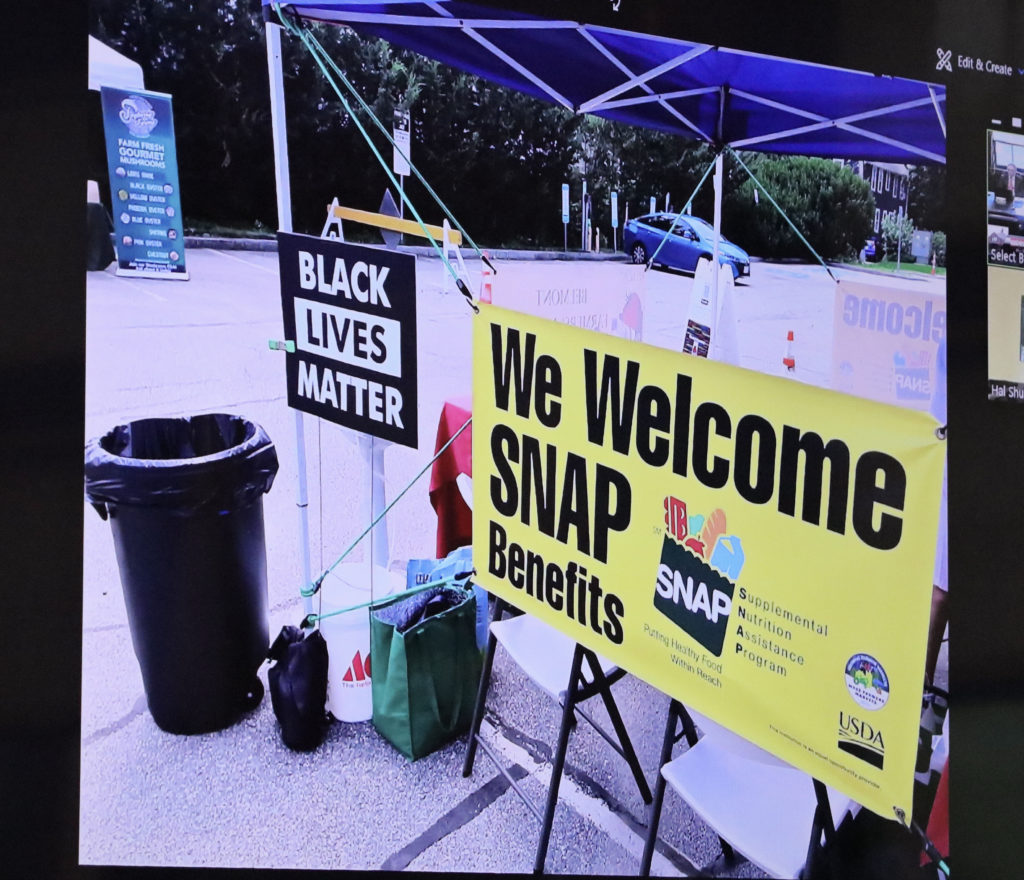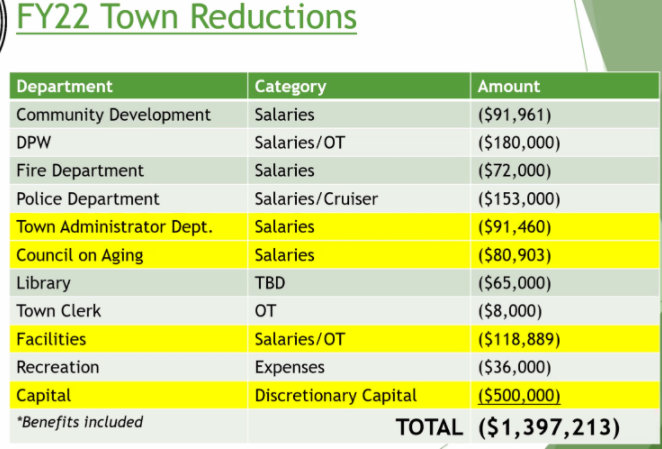Photo: The Belmont School District building
It may not be cheaper by the dozen but 12 residents are finalists to fill the Belmont School Committee seat vacated by Andrea Prestwich last month.
The 12 applicants is the same number as the last time a school committee position was filled in 2020, noted Board Chair Adam Dash, for “a thankless job but an important job.”
The candidates were announced at a Nov. 9 joint meeting of the Select Board and School Committee which will vote on Wednesday, Nov. 10, to select the new member.
The candidates are:
- Diana Cepeda, Trapelo Road
- Aisha Foxx Telfort, Betts Road
- Phillip Fremont-Smith, Somerset Street
- Ralph Jones, Summit Road
- Marko Labudovic, Carleton Road
- Frances Leighton, Thomas Street
- Jeffrey Liberty, Worcester Street
- Alessandro Miglio, Trapelo Road
- Glen Robertelli, Bay State Road
- Jerome West, Trapelo Road
- Jung Yueh, Waverley Street
- Amy Zuccarello, Elizabeth Road
A brief mission statement from each candidate can be found at the bottom of the article.
At Tuesday’s meeting, the two sets of members discussed the process of whittling down the candidates until the new member is selected. Following the lead of School Committee Chair Amy Checkoway, the selection will be a two step process. The first step is underway with a review of the application material made up of a statement off interest and the resume.
The second course of action, which the two groups hope will be completed within a two hour window, will take place Wednesday at a public meeting. There will be a “meet the candidate” during which each applicant will make a three minute opening statement which will focus on why they are applying for the role.
After this brief intro, the eight member voting group will reduce the pool to five finalists with a runoff if their is a tie for fifth. Those remaining residents will give short answers to questions from the group. Then a final vote will occur with the best candidate receiving a majority (five of eight voters) with additional rounds if no one reaches that threshold.
What type of skills and experience is the joint election group seeking? You name it! An understanding of the issues before the committee, communication experience, a background in negotiations, teamwork, budget and finance experience, knowing policy development and strategic planning, and being an inquisitive person would be perfect for this position.
Statement of interest from the candidates for Belmont School Committee (Cuts have been made for length)
Cepeda: “I would be a good candidate for this committee because my child attends Belmont High School and a racism incident occurred and I would like to join the committee to be a part of the solution to this issue. I have a background in accounting and want to share my experiences and talents.”
Foxx Telfort: “I worked as an RN for 15 years and currently stay home with 2 children who now attended the Wellington. After many years of nursing and being a mother and homemaker, multitasking, organization, planning, and caring about our community have become a major part of my life.”
Fremont-Smith: “In a time of elevated emotions and uncertainty I believe the School Committee needs people who are experienced, rational and empirical thinkers. Emotion can drive too much of the public discourse today and that can lead to distraction, or worse. In my HR & Talent Acquisition consulting business I have juggled and moderated a wide spectrum of issues serving many varied constituencies over the past several decades. I have developed a specific approach to problem solving over the years that is based on empiricism. I follow a simple MO; Calmly listen, calmly question/consider and then calmly proceed with what needs to get done.”
Jones: “As a former member of the School Committee, I can start immediately. This appointment comes at the start of the budget process for 2021-2022. My 25 years in elected and appointed positions in Belmont Town Government create a unique perspective on how to obtain the best school budget. Equally important is my experience in collective bargaining. During my nine years on the School Committee, I served on the bargaining teams for BEA Units A and B and AFSCME. Prior to my election to the School Committee in 1995, I conducted research for 12 years on the development of legal frameworks for municipal labor relations. I also worked as an apprentice arbitrator and mediator, developing skills in conflict resolution.”
Labudovic: “I believe I can provide leadership and help my community during these difficult times. I am particularly interested in helping with Special Education and Covid related activities. I believe in diversity and I challenge the status quo. I currently lead an organization of 1,000 people and I know how to get things done.”
Leighton: “I have over 20 years of experience in project and program management where I have learned to excel at managing large-scale processes and performing complex problem solving. I foster strong relationships within all levels of an organization, as well as with external vendors and clients. I am incredibly organized, detail- oriented and have strong communication skills.”
Liberty: “The Belmont Public Schools are at an important crossroads, and the Belmont School Committee faces many complex challenges and opportunities. I would like to put my nearly 30 years of experience in education at the service of the Town and the school system that our two children attend. I have broad, national expertise in a number of the areas that the School Committee oversees, and I have good working relationships with a number of the current Committee members as well as good insight into networks of students and families in town as a result of my volunteer activities over the years.”
Miglio: “Navigating modern day challenges requires curiosity, patience, kindness, and a steady hand. These are staples of my day-to-day life both as a manager at work and as a parent of two Belmont school kids.”
Robertelli: “20+ years running and leading life science organizations in the USA and overseas including invasive and non-invasive sensor technologies and diagnostics. Experience dealing directly with the FDA and regulatory authorities in Europe and other regions. Understanding of data and extensive experience presenting said data in front of live audiences and stakeholders including physicians, nurses and hospital executives. Senior Advisor to Metryx and its CEO, Shawn Rubin. Co-author of ‘Pathways to a Personalization: A Framework for School Change,’ in helping this educational startup maximize teacher efficiency and student achievement by increasing the frequency and accuracy of formative assessment in schools using tablet technology.”
West: “I’ve grown up and live around education. My mother was an elementary school literacy specialist, serving children who had fallen behind in literacy education. In the past, I have volunteered my time with the Maize Foundation and other tutoring groups, helping at-risk youth reach their peer goals in academic achievement. Beyond my passion for education, I am a risk management and security professional. This gives me experience in helping organizations implement applicable governance and policy requirements. Likewise, my professional technical and financial background will enable me to understand the budgeting process and drive the board’s decision-making.”
Yueh: “I have previously had the pleasure of working to help the Belmont school system. I served as the Butler PTA treasurer for 2 years and served on the Elementary School Advisory Committee on Hybrid Learning in 2020. When I worked as a pension and health actuary, I calculated the value of benefits in support of my corporate clients in union negotiations. I understand benefit terms, and how they potentially translate to current and future cashflow.
As a trained mediator, I was taught to look for creative solutions to reach consensus. It is often helpful to have someone who can listen to all sides and be able to play the role of a devil’s advocate in order to reach a thoughtful agreement.”
Zuccarello: “I was motivated to apply for this position because I am the right person to fill the open spot. I have more than twenty years of professional experience in a wide array of financial and legal matters which is directly relevant to the work of the School Committee. I work with clients to develop and negotiate budgets, often when substantial cost savings are required. I regularly work with different groups to bring people together to achieve a common goal. These skills will be valuable to the Committee in its work on the school budget and in negotiating with the teachers’ union, as and when needed.

